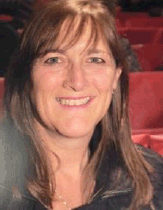
Susan Murray, Principal Lecturer in Engineering: from Industry to Academia.
My aunt worked in Engineering: she used to make the original microchips for Motorola, something that I found fascinating when I was a young girl.
At School, I managed to get my parents to fight for me to do woodwork and metalwork, instead of food and nutrition, as I was the main cook in my family at the time, having to return from School and prepare the meals; and I wasn’t particularly interested in pursuing these activities at school!
My career direction was determined early on at a career day organised by the Department of Trade and Industry at a Mechanical Engineering Research Establishment.
They must have liked me, as on the very same day I was offered a technical apprenticeship position as an Assistant Scientific Officer! I accepted the role, as I wanted to start to receive an income of my own. The experience was fascinating. I was moved to different departments every few months and they supported me to attend FE College and also to complete a CNNA which is a 4-year course in Industrial Engineering (equivalent to the current BEng). At the time I was married and had a mortgage; so this kind of support, which came with full-pay, was very handy! I enjoyed working on engines, robotics and the first CAD system linking it to machine numerical control programming.
I moved with my husband when he relocated to London and at this time, a job came up for Motorola, the first mobile phone factory in the UK. I started there as an engineer, taking parts from drawing to manufacture and assembly. The role involved a lot of overseas travel; mainly Chicago in the snow. I received training in the use of various simulation packages, developed project planning skills and carried out projects with capital expenditures of ten million pounds. As I joined Motorola at a time of expansion, I was part of the team responsible for developing their new site in Scotland. So I travelled to Scotland during the week taking staff with me to train new recruits there.

Susan Murray
Following Motorola, I was recruited as Production Manager for a company in Cambridge that specialised in lamps for material and chemical analysis, and eventually head-hunted for the role of Head of Manufacturing in Electrolux in Luton. I developed manufacturing and assembly operations for improving efficiency from design to manufacture. The plant shut down, so I continued working as a freelance manufacturing consultant with companies like McVities and Coca Cola. I wasn’t too keen on the lifestyle as it involved many nightshifts, travelling and staying over in hotels. It wasn’t glamorous. I looked around and secured a job with a company based in Heathrow as a Cycle-time Reduction Manager. My focus was on improving production efficiencies for people and processes. I had my daughter at that time and decided to look for employment nearer home in an attempt to achieve a better work-life balance. I started working for Amazon and went from Operations Manager to Senior Operations Manager, responsible for engineering and maintenance: upgrading equipment, changing layouts etc. In 2004 the effect on family life of two parents in full-time employment was noticeable. We were ticking along but were ship passing in the night and I said “You know what.
We need to do something different.” So I decided to follow other opportunities.
This is how I ended up in academia. While my salary is significantly reduced as an academic, and I no longer have a gardener or nanny, I am much happier as I can work flexibly. The change in work-life balance was phenomenal in terms of getting home, school runs etc.
After 3 years as a Lecturer, I became a Senior Lecturer in 2007 following the completion of an MA in Learning and Teaching. I enjoy teaching and love developing new courses. Attempting to progress to Principal Lecturer wasn’t easy but I succeeded in 2015.
I have been working very hard to develop my professional role and utilise my industry experience to enhance my academic career and student experience. I am involved in Knowledge Transfer Partnerships (KTPs), a programme that encourages collaborations between academics and businesses which require access to recent graduates and knowledge in a relevant area. In this role, I supervise projects externally in companies and write grant applications for them. This provides me with the opportunity to keep in touch with the manufacturing industry and the Technology used today; it feeds into my teaching and benefits my students. My involvement in KTPs led to me being commended in 2015 for a Vice Chancellor’s Awards at the University.
I knew that I had developed writing and research skills through my involvement in grant applications, reviews and accreditations, so I decided to embark on a PhD focusing on an area I had vast experience in the manufacturing industrial environment, and more specifically, my experience of teaching and my involvement in KTPs. The University is paying for the programme and my study time is acknowledged on my workload.
As a female in Engineering, a male-dominated area, I feel it is important to be a role model for young girls who may have the potential to build a career in Engineering. This is why I work with a range of organisations aiming to inspire and inform young children about the value, benefits and potential of a career in Engineering. I attend the Big Bang Fairs which aim to familiarise children with opportunities in STEMM areas. I carry out mock interviews, give talks on apprenticeships and offer my perspective on the many fields of Engineering. I took on the role of STEM Ambassador within the Science, Technology, Engineering and Mathematics Network (STEMNET). In this role, I help schools promote Engineering to young learners. I also work with Inspiring the Future, an organisation that connects state Schools and Colleges with people from industry. In this role, I talk to young people at Schools about career paths in Engineering. I make sure that I work with Schools in my local area and agree times with my line manager.
I am the Athena SWAN Champion for the School of Engineering and Technology and meet regularly with undergraduate and postgraduate students to discuss and help them understand the issues affecting women in advancing their careers in Engineering at each level and removing the barriers to their success.
As a parent, I have been able to work flexibly to suit different stages of my family’s needs. For example, when my daughter was at Primary School, my teaching schedule was adapted so that I wasn’t at the university after 4 o’clock. Now that she is at secondary school, I can do more activities outside the University. Things have become easier!





Leave a Reply